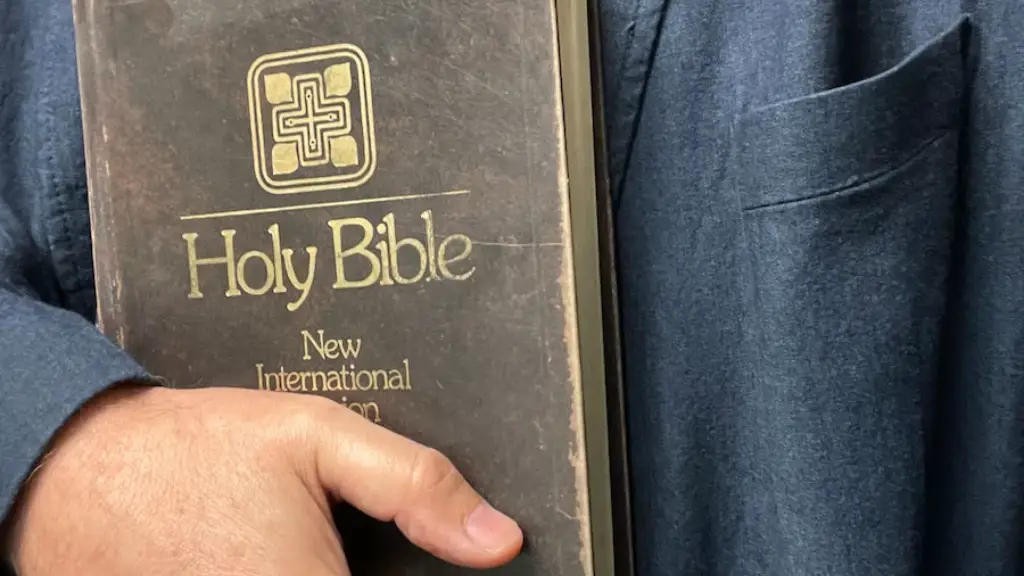‘Missing books of the Bible’ refer to a group of books that were not included in the official canon adopted by the ancient Christian Church. These so-called ‘lost books’ were excluded from the Bible for various reasons, such as authorship, relevance, authority, and many other theological considerations. They are mostly ancient texts that were excluded, but some modern writers have sought to include works that they believe should be part of the Bible, such as the Book of Mormon.
Although ‘missing books’ were never canonised, they remain important parts of Christian literature and have been a subject of study for many scholars and theologians. As a result of these studies, some of the books have been given additional titles, such as ‘Testaments’ or ‘Apocrypha’, which represent their particular content.
It is believed that the majority of the ‘missing books’ were written in the period between 200 BC and 200 AD, and include works such as the Testaments of the Twelve Patriarchs, the Book of Enoch, the Gospel of the Nazarenes, and the Apocalypse of Peter. These and other works describe events that occurred around the time of the life of Jesus in the New Testament, though they are not considered to be part of the official biblical canon.
The debate over the ‘missing books’ is ongoing. There are many who believe that these works should be considered authoritative, and thus should be added to the canon. Other scholars argue that these books were never part of the original Christian tradition and their writings should not be taken as scripture. Still others acknowledge the value of the writings but do not believe they should be included in the Bible.
One of the greatest challenges faced by those studying the ‘missing books’ is determining the authenticity of the works. Most of the available texts are centuries old, copied by hand and passed down through the generations. Scholars attempt to discern the authorship and accuracy of these works by studying them in detail and comparing them to other ancient documents. Additionally, some works have been translated over time, and so the accuracy of the translation is also subject to debate.
Regardless of the various opinions on the ‘missing books’, it is clear that they are an important part of theological study and Christian history. They may not be included in the official canon, but these ancient works provide insights into the worldview of the early Christians and can serve as a valuable resource for theologians and students.
Gnostic Texts
In addition to the ‘canonised’ books of the Bible, there are a number of ‘missing books’ that contain teachings from Gnosticism. Gnosticism is an ancient religious tradition that seeks to uncover hidden knowledge and understanding through spiritual enlightenment. The Gnostic texts are similar to the canonised works of the Bible in that they provide beliefs, teachings, and stories relating to spirituality. However, these Gnostic works often take a much different approach to the stories and teachings, leading to their exclusion from the official canon.
Many of the Gnostic works were written in the second and third centuries CE, though some of them can be dated to the first century. Their purported authors range from Jesus’ disciples to unknown authors. Unlike many of the ‘missing books’, these works were often widely circulated among early Christian communities and were also mentioned by some early Christian writers. However, these texts were largely excluded from the formal Christian canon due to their unique interpretation of spiritual teachings.
Interestingly, some of the teachings found in the Gnostic works can still be found in the Bible. For example, the Gospels of Thomas and Mary both contain teachings about ‘the inner kingdom of heaven’, which is also discussed in the gospel accounts in the New Testament. Additionally, the Book of Thomas, an early Gnostic text, deals with topics such as reincarnation and the powers of the soul, which can also be found in the Bible. These similarities suggest that some of the teachings from the ‘lost books’ have been preserved in the books of the official Bible over time.
The Kadosh Texts
The Kadosh texts are a group of books that were written by a Jewish sect called the Essenes, who lived in Palestine during the first century CE. These works are some of the oldest known ‘missing books’ of the Bible, and they include works such as the Book of Jasher, the Book of Jubilees, and the Book of Enoch. These texts provide a unique look into the theological beliefs of the Essene sect, and they also contain stories and teachings that differ from those found in the official canon of the Bible. The Essenes believed in a purification of the soul, the resurrection of the dead, and a coming messianic kingdom.
Some of the teachings found in the Kadosh texts have been found to be consistent with those of the authors of the Bible, suggesting that these works may have influenced the authors of the scriptures. For instance, the Book of Jubilees contains a detailed description of the world before the time of Noah, which is similar to the description given by Moses in the book of Genesis. Additionally, some of the prophecies found in the Book of Enoch are also similar to those found in the Bible. This suggests that the authors of the Bible may have used the Kadosh texts as sources of information and inspiration.
These ‘missing books’ are significant because of their unique insights into the beliefs, teachings, and stories of the ancient Jews and Christians. While they may not be included in the official canon of the Bible, these works still provide valuable information that can help people better understand the scriptures and their historical context.
Fringe Texts
In addition to the ‘missing books’ that have been excluded from the Bible for various reasons, there are also a number of works that are often considered to be ‘fringe texts’. These are works that may have originated prior to 200 AD, but have not been studied in depth by scholars and theologians. As a result, their authorship and accuracy are often contested, and they are not widely accepted as biblical works.
These fringe texts include works such as the Book of Enmerkar, the Books of the Cave of Treasures, and the Book of Joseph the Levite. These works contain stories and teachings that are often quite different from those in the canonised texts, and may even contradict them. For example, the Book of Joseph the Levite tells a story of the retribution of God against those who wronged Joseph, which is not found in any other biblical texts. Thus, it is often assumed that these works are not part of the Bible, but they can still provide valuable insights into the beliefs and practices of ancient cultures.
The ‘fringe texts’ are important because they reveal the theological diversity that existed among ancient societies. By studying them, we can gain a better understanding of the various beliefs and practices of these societies, which can shed light on our own faith and beliefs. Though these works may not be accepted as part of the Bible, they still provide valuable information that can help scholars and theologians better understand the beliefs of those societies.
Modern Texts
In addition to the ancient texts that were excluded from the Bible, some modern authors have sought to include works of their own in the canon. One of the most well-known examples is the Book of Mormon, which was written in the 19th century by Joseph Smith and is regarded as part of the official canon of the Church of Jesus Christ of Latter-Day Saints. Other modern authors also seek to include works of their own in the Bible, such as the writings of F.W. Boreham and C.S. Lewis.
Though some modern authors have sought to include their own works in the Bible, it is unlikely that these works will ever be accepted as part of the official canon. It is important to remember that the canon is set by the Church, and the Church has adopted a strict set of criteria for inclusion. As a result, there is little chance that modern works will ever be accepted into the canon.
The inclusion of modern works into the Bible is a controversial topic, and it is one that causes debate among many theologians. Some argue that the works of modern authors should be included in the canon, as they can provide valuable insights into the modern world. However, other theologians believe that the canon should remain unchanged, and that modern works should not be included.
Regardless of which side of the debate one takes, it is important to understand that the ‘missing books’ of the Bible have influenced the development of modern Christianity and have provided theologians and scholars with valuable insights into ancient faith and practices. As a result, it is important to pay attention to these works and to understand their relevance for today’s world.




